The political A to Z of Northern Ireland in 2021
- Published
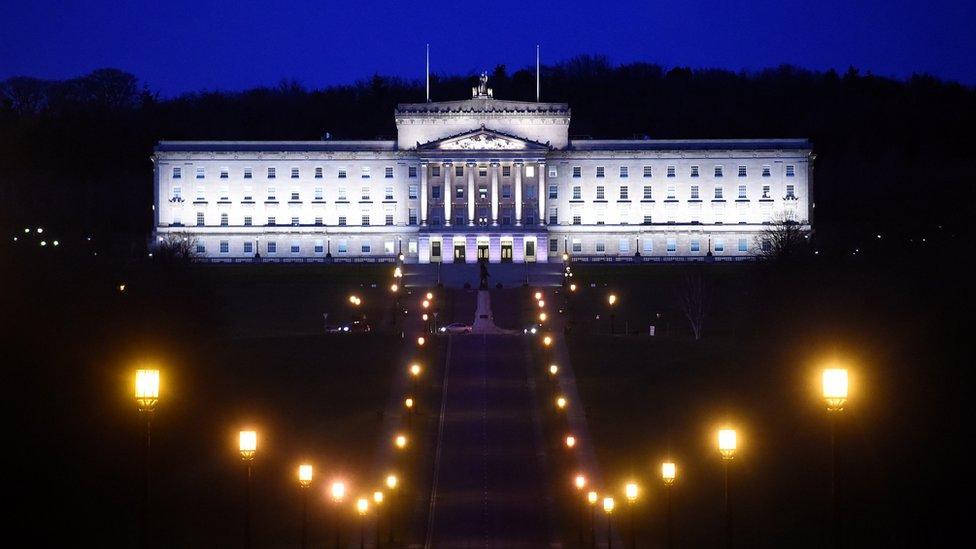
Three Democratic Unionist Party (DUP) leaders, two climate change bills and some mixed views on Northern Ireland's centenary.
It has been a busy year for Northern Irish politics in 2021.
Here is my alphabetic rundown of the past 12 months.
A is for Anderson
Republican icon Martina Anderson's political career came to an end after she and fellow Foyle assembly member (MLA) Karen Mullan were stood down by Sinn Féin after an internal investigation.
She described it as a "body blow" but her family went much further.
Her sister claimed she had been "humiliated" adding: "The British could not do to our Martina what her comrades and friends have done."
B is for Barnier
You may have thought we'd heard the last of the EU's former chief Brexit negotiator Michael Barnier in terms of Northern Ireland.
Well, he had one parting shot in his diaries, saying he found it "difficult to stay calm" while meeting the DUP's Arlene Foster and Diane Dodds.
The DUP, he said, "oppose everything" and "don't want to hear about the concrete proposals we are making".
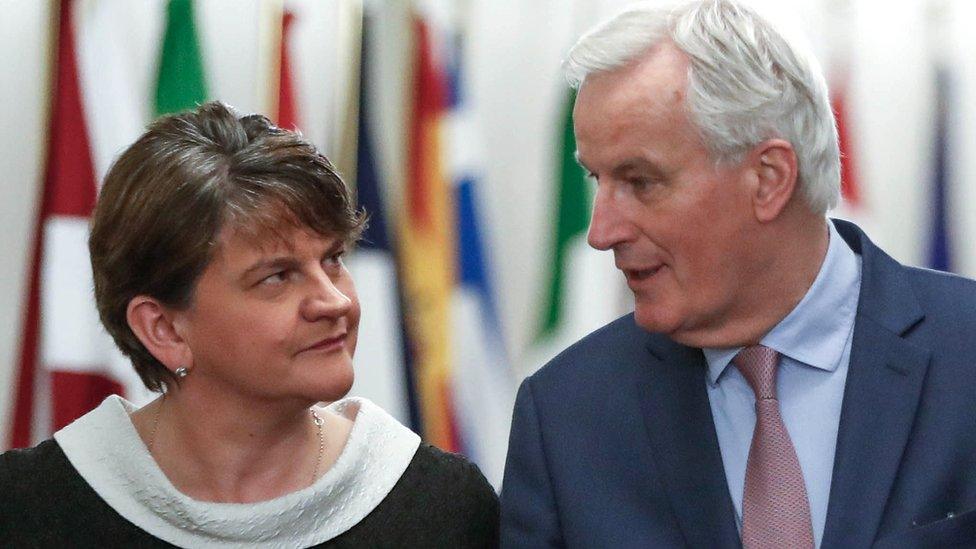
Michel Barnier published diaries which he kept during the Brexit negotiations, in which he described frustrations dealing with Arlene Foster
As for Mrs Dodds and Mrs Foster, he said they "don't like each other and it shows".
Mrs Foster said his judgement was "flawed on many levels".
C is for Centenary (but definitely not for celebration)
One-hundredth birthdays are normally marked with a telegram from the Queen.
Northern Ireland almost got a visit instead but that was foiled at the last minute by illness.
Church leaders reflect on NI's centenary
Rather more controversially, Irish President Michael D Higgins declined an invitation to an interdenominational church service, claiming the event had become "politicised".
Sinn Féin refused to allow either a statue in the grounds of Stormont or the lighting up of Belfast City Hall.
D is for DUP
The party that had the same leader for the first 36 years of its life somehow contrived to have three in just over a month.
Along the way the cracks under the surface of the self-proclaimed "one big, happy family" were exposed as never before.
E is for Election
The next Stormont assembly poll is still planned for May. The campaign seemed to begin last January.
F is for Foster
This was the year in which Northern Ireland's first minister was removed, courtesy of an internal DUP coup.
As a result, Arlene Foster refused to go to the party's 50th birthday party.

Arlene Foster - pictured on the steps of Stormont on 11 January 2016 on her first day as First Minister of Northern Ireland - quit the job this year
She sang some Frank Sinatra at her swansong in County Fermanagh - "That's life. That's what all the people say. You're riding high in April, shot down in May" - and became a TV presenter for GB News.
Apart from that, not much happened.
G is for Gray
Sue Gray began the year running Stormont's Department of Finance.
She ends it running the investigation into Downing Street's lockdown parties, which may decide the ultimate fate of Boris Johnson.
In her first, and so far only interview, Sue Gray told BBC News NI she was overlooked for the top job in the Northern Ireland civil service because "people may have thought I was too much of a challenger or a disrupter".
In the next few weeks we can all decide if that is true.
H is for Hunt
Which issue provoked the most consultation responses in Stormont's history?
The legacy of the Troubles? The Irish language? Abortion?
No, hunting with dogs.
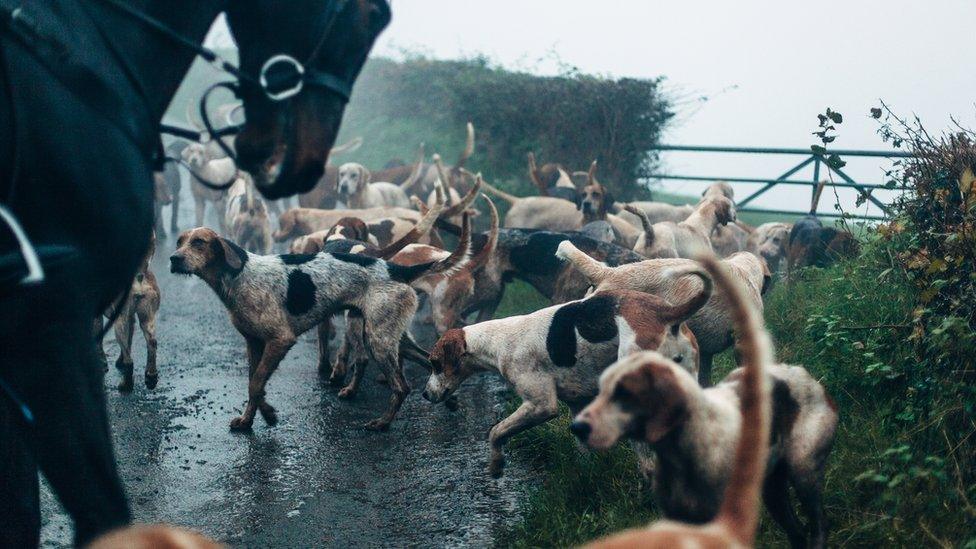
Hunting with dogs has been illegal in England, Scotland and Wales since the early 2000s
Eighty percent of respondents were opposed yet a private member's bill seeking to ban the practice was voted down thanks to the majority of DUP MLAs and all of Sinn Féin's opposing it.
That appeared to fly in the face of comments by Sinn Féin president Mary Lou McDonald, and brought criticism from, among others, the USPCA.
I is for Irish
The issue that prevented the assembly coming back for three years also indirectly spelled the end for Edwin Poots' three weeks at the helm of the DUP.
Sinn Féin made clear they weren't going to allow him to nominate a new first minister unless the DUP agreed to legislate for the Irish language.
They refused, so Westminster agreed to do it over Stormont's head.
It still hasn't happened though.
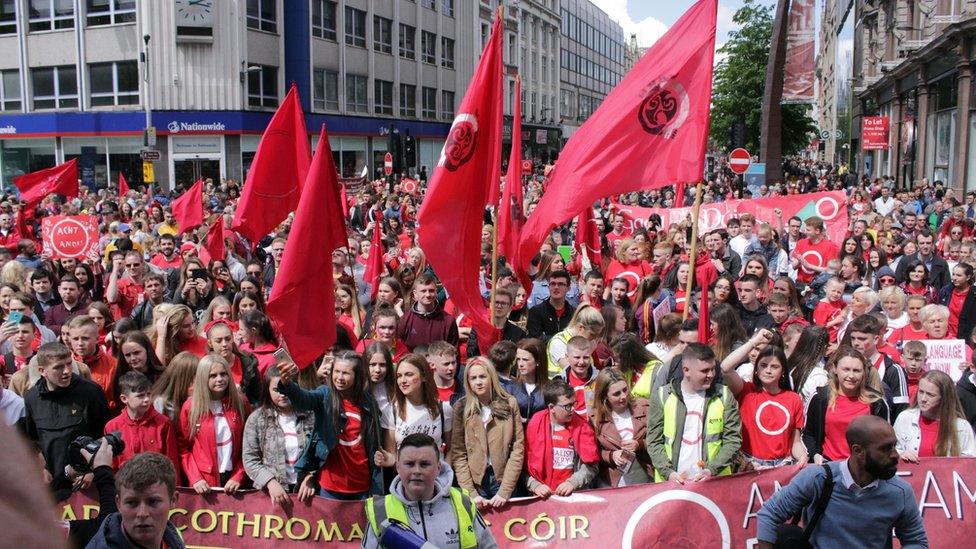
Thousands attended a rally in Belfast in 2017 calling for an Irish language act
J is for Jobs
As in, how many does one person need? If you're an MP, it seems, quite a few.
Owen Paterson, the former Northern Ireland secretary, was found by the Parliamentary Standards Commissioner to have acted as a paid lobbyist for two companies, used his parliamentary office and stationery for his consultancy work, and failed to declare his interests in some meetings.
Randox and Lynn's Country Foods paid him much more than his MP salary.
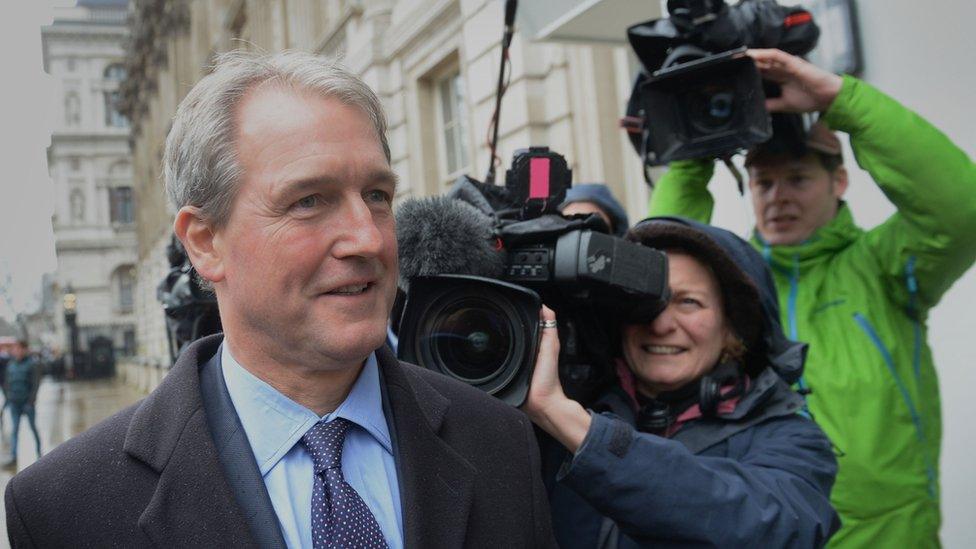
Owen Paterson quit at the start of November but insisted he was "totally innocent" of breaking lobbying rules
The UK government at first helped him avoid a 30-day suspension, then u-turned overnight.
He quit as an MP but lots of his colleagues found themselves in an uncomfortable glare.
K is for Kyle
East Belfast GP and councillor for the Progressive Unionist Party (PUP) John Kyle went against his party leader Billy Hutchinson - and any elected unionist you can think of - in seeing some benefits in the Northern Ireland Protocol (see P).
While opposing it he said it could present "significant opportunities".
Like the protocol itself, he now faces an uncertain political future.
L is for Legacy
The UK government succeeded where most others have failed in uniting Northern Ireland's political parties.
But not in a good way.
Its proposal that all Troubles-related prosecutions be ended went down like a lead balloon.
Legislation was supposed to be brought in the Autumn, but still hasn't appeared.
M is for Macron
Reports claimed the French President Emmanuel Macron said Northern Ireland was not a part of the UK during a row at the G7.
"Were you offended by President Macron's comments about Northern Ireland?" asked the BBC's Laura Kuenssberg
The then Foreign Secretary Dominic Raab said the remark was "offensive" and that EU figures characterised Northern Ireland "as somehow a separate country".
Mr Macron said he never questioned "the integrity of the British territory".
N is for North-South
The DUP decreed there cannot be normal relations between the two parts of Ireland if relations between Northern Ireland and Great Britain were affected by the protocol (see P).
So the party failed to turn up at a number of meetings between ministers from the executive and the Irish government.
A High Court judge ruled the move unlawful but refused to intervene in an ongoing political dispute.
O is for O'Neill (as in: Hill of the)
Fittingly for such an ancient setting, those joint post-executive meeting news conferences in Dungannon featuring Arlene Foster and Michelle O'Neill now seem like halcyon days - the occasional row over a certain funeral aside.
Whether by accident or design, Mrs Foster's successor Paul Givan and Ms O'Neill are seen together less often.
P is for Protocol
Opinion is divided.
"A choice between the political institutions and Protocol"
It's either the greatest threat to the union in 100 years (copyright almost any unionist you like), or a distant fourth in most people's priorities (including unionists'), according to a survey by the University of Liverpool.
DUP leader Sir Jeffrey Donaldson threatened to pull down Stormont over the issue but, like the protocol, it remains in place.
Q is for Queen
The Queen's last-minute absence from that service in Armagh city sparked a thousand conspiracy theories.
Namely, had she pulled out because of the controversy sparked by Irish President Michael D Higgins' decision not to attend?
Until, that is, it was revealed she had spent the night before in hospital.
R is for Randox (see J is for Jobs)
Until this year the successful Crumlin-based diagnostic firm was probably best known for sponsoring the Grand National.

Sir Keir Starmer said that Randox had been awarded two contracts worth about £500m for Covid testing equipment
That was before it found itself at the centre of a Westminster row about MP Owen Paterson's lobbying.
Labour leader Sir Keir Starmer called for an inquiry into how the County Antrim firm was awarded contracts worth almost £500m for Covid-19 testing equipment.
Randox paid Mr Paterson more than £8,000 a month.
S is for Sash
"It was old but it was beautiful" goes the old Orange ballad - as you don't need to tell Cabinet Minister Michael Gove.
At least according to Ian Paisley who said Mr Gove once boasted in his local paper that he could sing the song.
Cabinet Office Minister Michael Gove boasted about singing The Sash, says Ian Paisley
The North Antrim MP somehow wove the tangential fact into a debate about Brexit, challenging Mr Gove to prove his unionist credentials.
The Scottish-born levelling-up secretary countered by revealing he could also blast out The Fields of Athenry and, more shockingly, the English rugby anthem Swing Low, Sweet Chariot.
T is for TUV leader, Jim Allister
Mr Allister made headlines in November over remarks he made following the death of former rugby international, and TUV and DUP councillor, David Tweed.
Tweed, who served time in jail for child sex abuse, died in October in a motorcycle accident.
In 2012, he was convicted on child sex abuse charges, which were quashed in 2016 after he served four years of an eight-year sentence. His conviction was quashed due to the way the jury had been directed in his initial trial.
Following his death, tributes were paid by former political colleagues, including the TUV leader who described him as "larger than life".
However, Tweed's victim and stepdaughter Amanda Brown, who was abused by her stepfather from the age of eight, criticised those comments.
At first Mr Allister stood by his message of condolence but later apologised saying Tweed's daughters were "clearly hurting".
The apology was rejected.
U is for the Ulster Unionist Party
Shedding leaders was a popular pastime for the unionist parties this year.
The Ulster Unionists did it even before the DUP when Steve Aiken fell on his sword to be replaced by Doug Beattie.
Mr Beattie immediately lauded his liberal credentials and the "Beattie bounce" became a thing.
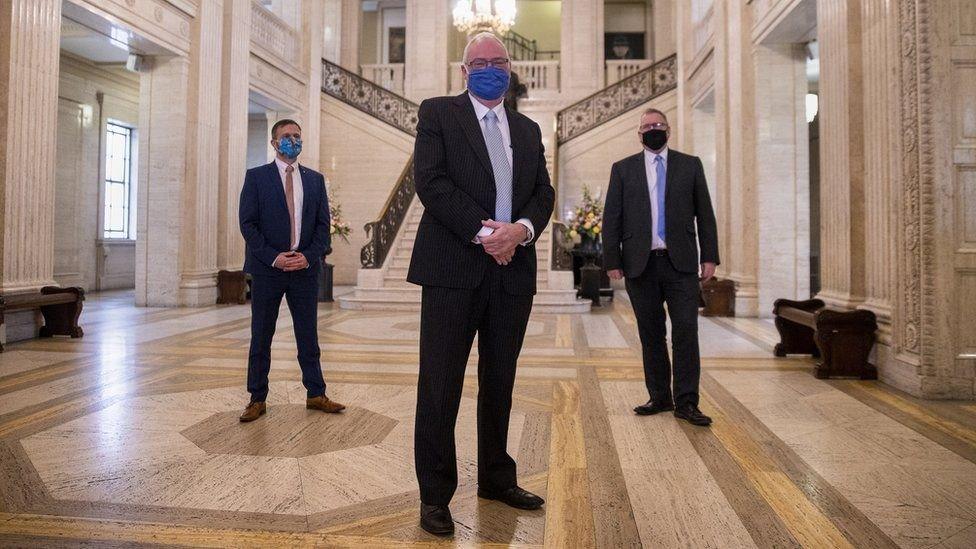
Upper Bann MLA Doug Beattie (right) replaced Mr Steve Aiken (centre) as leader of the UUP
That is set to be tested next May (see E for Election).
It's not the first change of direction for the party in recent years.
Some might ask: "Will the real Ulster Unionist Party please stand up?"
V is for Van Morrison
Unlike Madame George, Moondance and Into The Mystic, "Robin Swann is dangerous" will probably not appear on any Van Morrison greatest hits album.
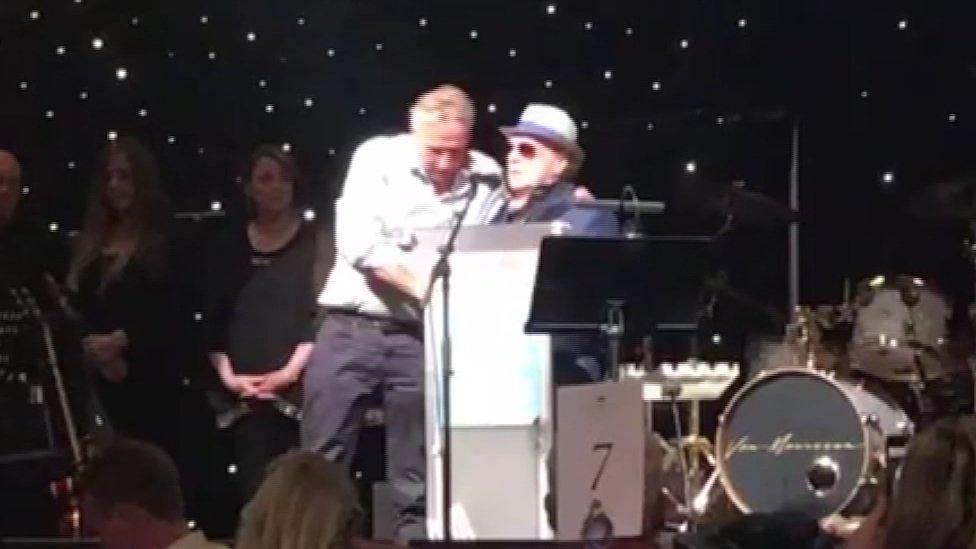
North Antrim MP Ian Paisley joined Sir Van Morrison on the stage at the Europa Hotel in Belfast
It could yet be one of his most memorable, however, thanks to the health minister's decision to resort to legal action over it.
W is for Wilson
In an interesting year for the DUP, Sammy Wilson remains a one man news machine.
It is hard to say who was less amused by his increasingly tortured anti-Covid restrictions tweets loosely based on Hark the Herald Angels Sing.
We'll go for his party leader Sir Jeffrey Donaldson who had to tell him that "Covid is no laughing matter".
The East Antrim MP didn't agree and did it again.
First Minister Paul Givan said the East Antrim MP could "speak for himself".
He can and it seems he will.
Allow X content?
This article contains content provided by X. We ask for your permission before anything is loaded, as they may be using cookies and other technologies. You may want to read X’s cookie policy, external and privacy policy, external before accepting. To view this content choose ‘accept and continue’.
X is for Xmas
Former Sinn Féin President Gerry Adams got into the spirit with a video that featured him turning up on a doorstep and singing "tis the season to be jolly, tiocfaidh ar la la la" and had references to not going away, you know, etc.
But, according to some victims of IRA violence, it wasn't so much "ho ho ho" as "no no no".
The virtual Christmas card was withdrawn by the charity for which it was produced and one Sinn Féin TD said Mr Adams should apologise.
The party's vice-president Michelle O'Neill, however, disagreed.
Y is for Year '21
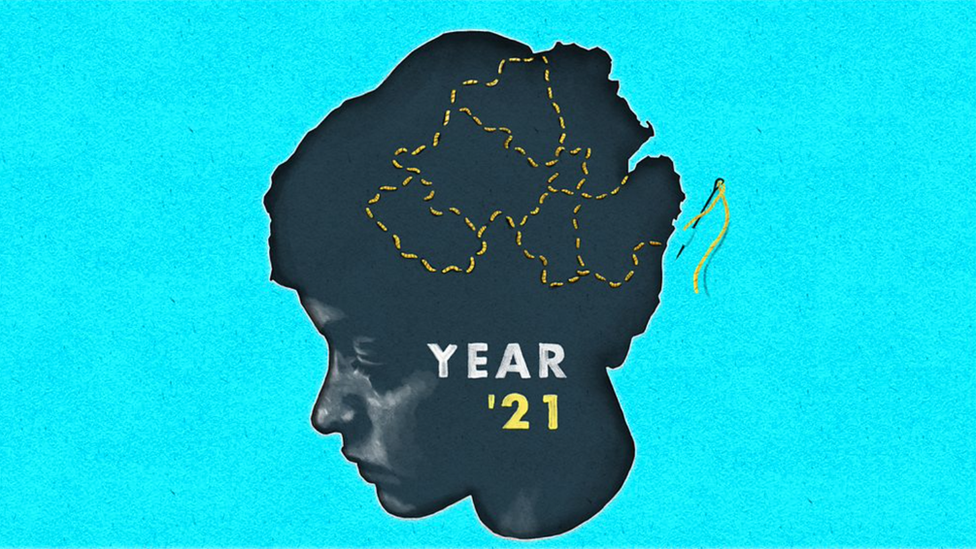
In the Year 21' podcast Tara Mills and Declan Harvey explored how Northern Ireland was created 100 years ago
Some shameless self-promotion here.
BBC Northern Ireland's brilliant podcast was a must for anyone who, in this centenary year, was remotely interested in how we got to where we are from where we were 100 years ago.
Z is for Zero
Net zero - not adding to the amount of greenhouse gases in the atmosphere - by 2050 is the target.
How are we doing?
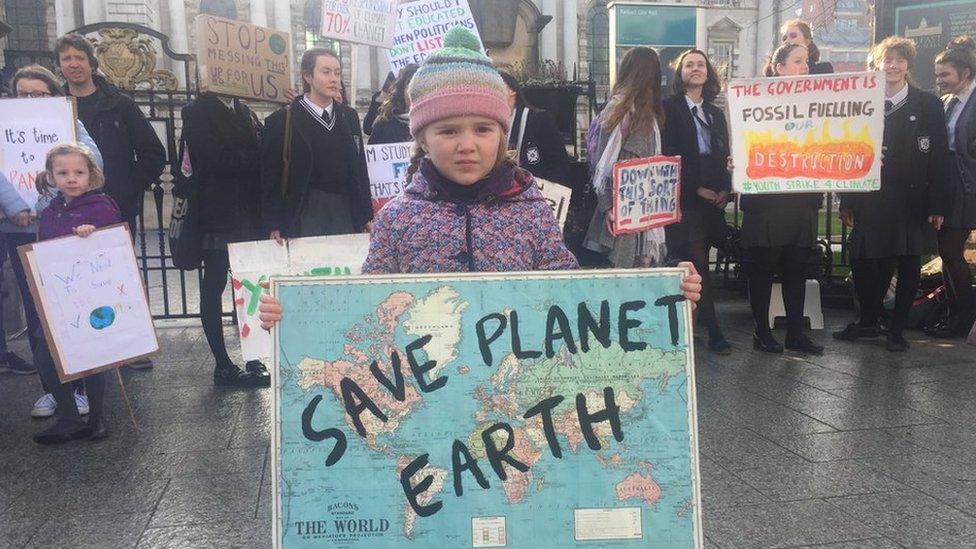
There are two climate bills competing for approval at Stormont
Well, after years of no specific climate legislation here there are now two competing climate change bills going through Stormont at the same time.
Green Party leader Claire Bailey introduced her bill with a target of net-zero carbon emissions by 2045.
The Agriculture, Environment and Rural Affairs Minister Edwin Poots, countered with his own bill, stating that Ms Bailey's would cause "devastation" to the rural economy.
A uniquely Northern Irish solution, you might say.
- Published28 December 2020
